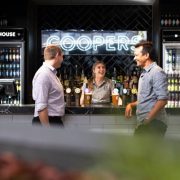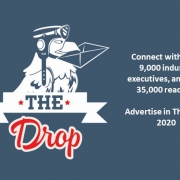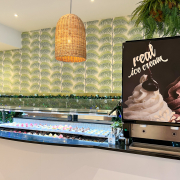HOSPITALITY INDUSTRY BOUNCE BACK IN 2021?
Right now, the Australian hospitality industry feels like it’s in no man’s land. The Christmas season is in full swing, Melbourne is returning from a hellish lockdown with a vengeance, and some restaurants around the country are as busy as they were 12 months ago.
And yet the spectre of Covid-19 is never far away. Right now, it’s easy to feel like coronavirus has been beaten, but we’ve been here before. The fact remains, many parts of the economy won’t return to normal until a vaccine is rolled out, which is slated for March at the earliest.
With this in mind, we wanted to check in on restaurateurs and industry experts from around the country and get a feel for how they’re travelling after a nightmare year, and how they envision 2021. A lot has changed since the winter, but much hasn’t, also. What does the future hold for hospitality in 2021? How differently do they feel about the industry compared to six months ago? And what are the trends they’re seeing that they think will stick around?
So we asked five simple questions. We present their answers here, lightly edited for length, clarity, spelling and grammar. In some cases where several similar answers were supplied, we selected the most insightful and concise only.
Do you think hospitality will bounce back in 2021?
Yes, I believe so. But until we have a vaccine we will need to learn to adjust to pivot our business in best possible way.
Sasa Sestic, owner, Ona Coffee, Melbourne, Sydney, Canberra
While restrictions remain on international travel and large gatherings for entertainment, there’ll definitely be increased demand for hospitality businesses far and wide as people explore regional Australia and capital cities known for great dining. We’ve already seen demand outstrip supply due to capacity restrictions in Melbourne and Adelaide.
Emily Raven, co-owner, My Kingdom for a Horse, Adelaide
Hospitality will bounce back because everyone needs to eat. Nothing can replace the experience of eating out, whether it’s for a quick bite or a fancy dinner.
O Tama Carey, owner-chef, Lankan Filling Station, Sydney
It’s hard to say, I very much hope it will. But something tells me 2021 could be a tough ride.
Scott Brannigan, co-owner, Coogee Common, Perth
Melbourne people value our incredible hospitality offering and this is already being seen [post-lockdown]. That, coupled with a new found appreciation for being out – I think there’s no question about it bouncing back. Sadly, some venues did not make it through the past eight months, which means there is now less choice. Those that were lucky enough to survive are already seeing a strong resurgence. Now, we just need more staff.
Matt Lane, co-owner, Mamasita and Hotel Jesus, Melbourne
Yes, I do. You can already feel customers’ energy in the weeks following the reopening. Eating out is a massive part of people’s social lives and will continue to be if it’s safe for them.
Cameron Votan, co-owner, Happy Boy, Snack Man, Greenglass and Kid Curry, Brisbane
There is no doubt. The minute restrictions lifted in Adelaide, people were back in droves. It’s only corporates working from home and the square-metre rules stopping the industry going back to normal.
Paul Baker, owner, Chefs on Wheels, Adelaide
Hospitality will continue to fight. We will always find a way.
Kylie Javier Ashton, restaurant manager, Momofuku Seiobo, Sydney
Definitely. I’m pretty optimistic that the whole economy will bounce back next year.
Katrina Ryan, owner, The Golden Pig, Brisbane
It will depend on the state of the pandemic. For us in Adelaide, I think there’s a desire for hospitality. People are out and spending money, so I feel hopeful for what comes next. I think there has been a shift in what hospitality is. Hospitality is as much about entertainment, it’s experiential – people come out to restaurants and bars to be out of their normal lives. Hospitality has to rise to that expectation. Seatings, deposits for bookings and set menus will be the norm – they are all ways we can ensure that we can offer “the experience”.
Daisy Miller, co-owner, Sukhumvit Soi 38, Adelaide
Yes, because dining out and being social is part of our culture. Normality in hospitality will resume at some point. I also believe we are close to getting this under control and that’s probably in the form of a vaccine.
George Kailis, owner, Kailis Fish Market Cafe, Island Market Trigg, The Shorehouse and Canteen, Perth
Yes, if we present a united front to the government about our needs. Hospitality needs a real, effective, passionate union to protect us. As an industry, we are always the first to rally behind a cause, often at our own expense, and it’s time for that generosity to be returned.
Nikki Friedli, former restaurant manager, Africola, Adelaide
Hospitality in Melbourne will bounce back in 2021. There’s no doubt that many businesses will not survive and many people will lose their jobs, but ultimately we are social creatures and crave connection. Restaurants bring people together and food is a common language.
Nathan Toleman, CEO, The Mulberry Group (Hazel, Dessous, Beach House Geelong and Liminal), Melbourne and Geelong
Absolutely. People will always love being fed and watered. Our industry is constantly growing and evolving – we’re all just looking towards the “new normal”.
Chris Howard, head chef, North Bird Dining Room and Wine Store, Perth
I believe and hope that normality will come back very quickly. Especially once we get a vaccine and borders open up.
Hugh Allen, executive chef, Vue de Monde, Melbourne
It will – it’s a resilient thing. Although it should look and act very differently than pre-Covid, but time will tell on that.
Aaron Turner, owner, Igni Tacos y Liquor and The Hot Chicken Project, Geelong
Yes and no. Some areas of the sector will bounce back quicker than others. Staying local has seen many venues in the suburbs stay strong. The effects of the lockdowns were so indiscriminate based on your location. I think CBD-based places that rely so heavily on events, sport and residual trade from the city workforce will take a long time to bounce back. That being said, the destination restaurants, of which we have plenty, will spring back into action and thrive.
Simon Blacher, director, Commune Group (Hanoi Hannah, Tokyo Tina and Firebird), Melbourne
We are lucky that everyone needs to eat and drink. With Covid subsiding in Australia, the public are craving experiences based around hospitality.
Michael Bascetta, co-owner, Capitano, Bar Liberty and Falco Bakery, Melbourne
I have great faith in our community that things will bounce back. It might look different to what we’re used to and we’ll have to do lots of adjustments, but there’s so much passion and creativity and that’s not going anywhere.
Meira Harel, Grow Assembly, Adelaide
Yes. Because we always do. And that makes our industry so amazing. We will always find ways to overcome the challenges we face.
Junda Khoo, co-owner, Ho Jiak, Sydney
Hospitality is an industry that is no stranger to unforeseen circumstances. While this year is perhaps as extreme as you could imagine, the ingenuity and creativity that exists will find a way to thrive in a post-Covid world. People will always eat and drink out.
Ollie Margan, co-owner, Maybe Mae, Adelaide
Although it’s been an incredibly challenging year, the industry is resilient and I believe the Australian public genuinely wants to support it more than ever.
Adam Liston, coowner, Shosho, Adelaide
Yes, stronger than ever. People more then ever want to be out celebrating, laughing and around friends and family.
Giorgina Venzin, owner, Pawpaw, Mons Thai and Darvella, Brisbane
Of course it will. We’ve proven time and time again that hospitality is the most innovative, resilient and creative industry in the country – although it has been altered forever. What’s happened to us all globally is well and truly unprecedented – but the chances of hospitality bouncing back? Well that’s just normal. Its what we do.
Brendan Carter, co-founder, Unico Zelo, Adelaide Hills
Yes, indeed, as the city workers come back and the country gains a new confidence – then our great restaurants will benefit as people seek out their favourite places to socialise and entertain.
Chris Lucas, founder and CEO of Lucas Restaurants (Chin Chin, Kong, Kisumé, Baby Pizza and Hawker Hall), Melbourne and Sydney
Hospitality in 2021 will look different to any other year. If anything, 2020 has shown us that people in hospitality are freaking resilient and can think on their feet. It’s also shown just how important hospitality is to the general public. People really missed going out to restaurants, to their favourite bars and they appreciate everyone in hospitality so much more and will want to support them more than ever. It’s going be a tough year, no doubt, but hopefully it’s on the way back as the public’s support and hunger for good hospitality experiences will be greater than ever.
Tamrah Petruzzelli, director, Super Assembly, Adelaide
Yes. [The suburbs are] already bouncing back with people flocking back to shopping centres and restaurants. The Melbourne CBD will have to wait until people return to the office to get back to the hustle and bustle it was before.
Jerry Mai, owner, Bia Hoi and Annam, Melbourne
Hospitality will definitely bounce back. I can even see it being stronger than we have seen over the last few years. With every round of eased restrictions, we have seen instant uptake within each of our venues. Demand has been much greater than capacity and with international travel not yet on the cards, I think people will continue to look for great experiences in their own backyards. We will also see a lot of venues not reopen. This will reduce competition and increase demand for venues that traded through.
Oliver Brown, owner, Nola, Anchovy Bandit, Yiasou George and The Stag Public House, Adelaide
It will recover as people want to get back to normal and frequent venues as they did pre-Covid.
Johnny Moubarak, owner, Gerard’s Bistro, Brisbane
It’s a bit hard to predict until we see an official vaccine rollout to know if there will be further large outbreaks that see some states go into lockdown. But I’d like to think that come 2021 the federal and state health departments have worked out their shit enough to handle a outbreak without needing to go to such drastic measures. [NSW Premier] Gladys Berejiklian seems to have it sorted and if the others can follow suit I think that hospitality would look to have a pretty healthy year. Without international travel, people have a lot more disposable income and are happy to spend more locally, which is a great thing for Australian hospitality.
Sali Sasi, co-owner, Leigh Street Wine Room, Adelaide
What are the major trends you think we’ll see in the industry in 2021?
I can see more focus on deliveries, home packs, more digital apps coming, and more focus on local and the community.
Sasa Sestic
Regional restaurants are going to absolutely boom as people can’t travel. Local provenance is definitely on-trend as supply chains remain disrupted and Australian producers can cash in on the strong buy-local sentiment. Good quality casual dining could see strong turnover for family gatherings with less money per head to spend after Jobkepper and so on is wound back. Where a family might have spent $60–$100 a head on a special occasion, they’ll splash out on a fancy brunch instead.
Emily Raven
Outdoor dining.
O Tama Carey
Green shoots. Lots of young operators able to cut through due to some older wood being cut down.
Cameron Votan
There seems to be lots of small-bar cheap-eat places opening.
Scott Brannigan
Slightly simplified offerings with respect to wine lists, menus and staffing models, and a general lean towards produce and wine from smaller scale and often organic farms.
Campbell Burton, co-owner, Public Wine Shop, Melbourne
I think we’ll see smaller menus, as a reaction to fewer available staff. There’ll be more banquets, less a la carte, shorter hours of operation, fewer days and possibly less meat-heavy menus. There’ll be more non-alcoholic wines, beers and mocktails – it’s been a tough year mentally for a lot of people and I guess you either drank your way through or stopped drinking entirely. I also think table service will be less available with order-and-pay technology being more common as operators realise the way we operated prior to Covid was simply not sustainable.
Matt Lane
More options popping up in people’s neighbourhoods, including more specialised business-owned delivery.
Raph Rashid, owner, Juanita Peaches, Beatbox Kitchen and Taco Truck, Melbourne
In Brissie, I think we’ll might see a little more South American cuisine such as Argentinian barbeque and perhaps Nikkei food (Peruvian ingredients prepared in a Japanese style). We’ve already seen a recent spate of Mexican restaurants opening up.
Katrina Ryan
I think we’ll see a greater importance placed on the provenance of food and drink. Supply chains were disrupted this year. Supporting local growers and producers has been more of a necessity. I think we’ll actually see venues being more true to themselves and maybe caring less about trends.
Daisy Miller
We’ll see a shift to more fine dining or smarter dishes but not necessarily in the traditional sense. This could be a casual-style eatery pushing the envelope with dishes and ingredients. Caviar has pushed forward in 2020 and I think 2021 will see guests indulging in more luxurious dishes but in a non-formal setting.
George Kailis
There’ll be more set menus, less a la carte.
Mary Randles, co-owner, E’cco Bistro, Brisbane
Small is beautiful will be a big trend. I think we are going to see a paring back of menus and drinks to be focused and precise. Bars, restaurants and their patrons will be learning about what living within their means looks like. Sustainability will be more important than ever, both environmentally and economically.
Nikki Friedli, Adelaide
There are the obvious ones like smaller menus, set menus, self-check-in and ordering at tables via apps. I think that with overseas travel limited for the foreseeable future, consumers will be looking for more local attractions where dining can be combined with other experiences. There will also be the rise of regional dining with more of a focus on local, sustainable produce.
Nathan Toleman
There will be less choice, less spontaneity, more set menus, more prescriptive business models.
Michael Ryan, owner-chef, Provenance, Beechworth
I’m not sure how long things need to be culturally relevant to qualify as a trend anymore. My hope is for more diversity and individuality, less mass thinking.
Chris Howard
Caution, as Covid grows overseas, but a large number of businesses in Australia will not survive.
Adrian Fini, co-owner, Bread in Common, Perth
I don’t quite understand trends. I know they exist and the frenzy they create but what they will be, I have no idea. Hopefully it’s just genuine hospitality.
Aaron Turner
The “barstaurant”. Until we are back to full capacity, bookings and seats will be sought after. Your dinner booking will become the focal point of your night out – the days of going to an area and just figuring it out are on pause for now. The venues that will really succeed are the ones that can amalgamate a great feed with a reason to get stuck into the drinks list.
Simon Blacher
We will see more retail friendly venues opening, along with simplified dining experiences that don’t break the bank.
Michael Bascetta
I think we’ll see the return of set menus and fixed menus, at least while capacity is still restricted. Street parties and cooking feasts will be a lot of fun.
Meira Harel
A lot of operators will be operating leaner and better with the experiences and lessons learned from Covid in 2020.
Junda Khoo
The stop-gap created by lockdowns provides an opportunity to reshape hospitality from an operational point of view. It would be great to see a more even representation of demographics in positions of power. A shortening of our supply chains also seems like an inevitable positive.
Ollie Margan
More honest cooking with a focus on satisfaction rather than ego. More customer interaction: after the pain we’ve all been through, the importance of knowing the people we serve is even more important.
Adam Liston
In Brisbane, more upmarket but casual dining – Queenslanders are unique, we want to be outdoors enjoying nice things but without the high-end fuss.
Giorgina Venzin
A love for local that’s not necessarily quality driven, but emotionally driven. Along with a desire for community, it’ll be less about the dollars and more about the connection. I feel hospitality will level up. Not because it has to, but because it wants to.
Brendan Carter
The three words that come to mind are community, collaboration and care. We will see a bigger focus on hospitality communities working together, more collaborations between different food producers and restaurants and chefs, and more locally- and ethically-sourced produce on menus. Menus will be tighter to avoid waste, and restaurants and bars will function with much less stock on their shelves. People will do more with less and will collaborate with their peers to get shit done.
Tamrah Petruzzelli
Bookings and more educated customers. We have already seen an increase in bookings as a proportion of total guests and the evolution of booking systems has helped. We will also see a stronger shift towards local, independent, and sustainable product choices. Covid-19 has shone a light on the positive effects of supporting local and I think people will continue to do so wherever possible.
Oliver Brown
How do you feel about the future compared to six months ago?
Time is a healer. It’s allowed us to plan and think deeply about what has happened and where we are going.
Mike McEnearney, co-owner, Kitchen by Mike, Sydney
Excited and thankful. When everything started we did not know what to expect. 2020 has given us opportunity to rethink everything and the chance to see how we want to go forward. In a way, we all have a fresh start and for me that is exciting.
Sasa Sestic
With the announcement of the vaccine it feels like light may now be visible at the end of the tunnel.
Cameron Votan
A lot more positive and we’re looking to keeping on going and keeping the positivity flowing through the venues and staff.
Scott Brannigan
Definitely more positive, but still with trepidation and anxiety for what’s going to happen. When Jobkeeper finishes in March, coupled with the end of extended footpath dining, I think only then will we see the true extent of how hard we’ve all been hit. Six months ago, in June I was coming to terms with potentially not having one or two restaurants to return to. I was, and am still, somewhat anxious about the state of the CBD. Many corporates I speak with still have no clear roadmap as to when or if they’ll be back in the high-rise offices.
Matt Lane
I’m pumped – working out how to transition is one of the keys to business.
Raph Rashid
Six months ago I was taking it week by week and not looking too far into the future. With all the uncertainty it was easier to focus on the now by feeding people and making their lives as easy and bloody delicious as possible. After having this time to reflect I have a much clearer idea of the future and what it looks like for myself as well as our model for Chefs on Wheels, which itself has grown and adapted all the way through this pandemic.
Paul Baker
I feel much more optimistic. The time away during lockdown gave me the opportunity to gain a bit of perspective and come back with a new appreciation for what we do. I am so proud of how resilient we are as an industry and I know that hospitality will always have a place in the world because we all crave to be fed and looked after.
Kylie Javier Ashton
Definitely feeling a little more confident and I imagine 2021 will see a return to normality with talk of vaccines rolling out early next year.
Katrina Ryan
I am eternally optimistic. Although I have some concerns about frustrated people who are increasingly taking their stress out on staff, my gut feeling is that that is a blip. As things feel more normal and more predicable, that tension will ease and an expectation of civility will return.
Daisy Miller
Much more comfortable. I think we may have this under control. Six months ago was like a scene from Mad Max.
George Kailis
I am more confident now than I was six months ago.
Nathan Toleman
Confidence, tinged with a little wariness.
Michael Ryan
I think years like this remind you to be optimistic and grateful while not forgetting the fragility of what you have.
Chris Howard
Better, as we are based in Western Australia.
Adrian Fini
I am quietly optimistic. Melbourne has endured through two lockdowns but seems to be bouncing back quickly. I think the lockdown has re-instilled the city’s love for everything food and drink. My hope is that this momentum can extend to our mates in live-music venues.
Simon Blacher
After seeing Victoria doing it tough and coming out of lockdown with amazing energy and strength, I have a so much hope and faith in the power of restoration of our industry. It’s not going to be the same as before but that’s not necessarily a bad thing. This year made everyone do a bit of a shuffle and rethink the way we do things and I think we’re going to be surprised with the results.
Meira Harel
I feel the same. The next six months is not guaranteed and there’s always uncertainty with Covid around. Things can change in a blink of an eye and we just have to stay on our toes to adapt quickly to whatever is thrown at us.
Junda Khoo
Less like this is a storm to weather, more like it’s the “new normal”.
Ollie Margan
Not too much different. It will be interesting to see how things go once the government support for all industries goes.
Adam Liston
Definitely a little more certain. We had a taste of both sides of the coin having had to shut our Bar Mummucc for a few months, which was a little scary. At Monsterella, our delivery and take-away infrastructure was already in place so we were able to continue operations almost as per usual.
Tania Nicolo, co-owner, Monsterella and Mummucc, Perth
Very confident. If you go into the city and you can see the growth in Brisbane.
Giorgina Venzin
Much more positive. Australia is virtually free of Covid and so we are in a lucky place.
Chris Lucas
Wow, six months ago feels like a lifetime. There was no clear path or an end to lockdown, which gave us no plan or direction, which made me feel helpless and like I had no control of my business and life. Now, with the easing of restrictions we can starting planning and mapping a path for the next couple of months. I feel I have control again and can start making decisions. Now we just have to deal with the lack of staff.
Jerry Mai
The past six months really sucked, but the future is definitely looking bright. People are keen to get out and support restaurants. Consumer confidence is up.
Oliver Brown
Much better because of how people responded after restrictions were loosened in Brisbane.
Johnny Moubarak
We’ve all had a really tough 2020 so I’d hope things can’t get any worse and the next six months are more about recovery and rebuilding. We feel optimistic enough to keep moving forward.
Sali Sasi
What’s your biggest concern as we head into 2021?
People’s spending habits. Climate change and how it has affected food supply, which has rightfully lifted the price of ingredients. The bottom line is whether people will put their hand in their pocket and pay the true price, or whether the hospitality industry will have to continue to shoulder the increases and not have the option to charge more.
Mike McEnearney
The situation in the world. In many countries Covid-19 is spreading more than ever before. As we said at the beginning of this pandemic we are in this together. I feel fortunate to live in Australia but knowing that the pandemic is still out there, I’m concerned that it can come back.
Sasa Sestic
I do worry in Brisbane that instead of the market opportunity being taken up small new owner operators, we get an influx of big faceless groups. I’d love a unique and vibrant culture of our own to emerge from this, not just a copy-paste from the other markets.
Cameron Votan
Continued blanket shutdowns without consideration for the unique fragility of the hospitality industry.
Emily Raven
Just the usual. Will people come to my restaurant? Will we have enough staff? Will we keep the people happy? And, a new one: will we have to live through another pandemic?
O Tama Carey
Covid shutting us down again.
Scott Brannigan
I want as many of my industry peers to survive this absolute catastrophe, but I know some won’t. If the state governments don’t pick and stick to a plan on how to manage this, then it will be just too much for most operators to come back from. This industry is hard enough without constantly changing restrictions and enforced shutdowns.
Paul Baker
I’m worried about a flow-on effect to the domestic economy with the trading relationship with China taking a serious nose dive.
Katrina Ryan
The expectations of guests need to change in terms of what it really costs to go out for dinner so that someone can pay their bills, earn a fair wage and go home mentally strong. No one wants to work 80 hours – it has been happening in hospitality because the margins are too thin to have two people doing a 40 hour week. We have worn that workload like a badge of honour for too long.
Daisy Miller
A massive staff shortage due to no holiday visas.
Mary Randles
The biggest concern for me is staff. I am hearing that everyone is struggling to find good staff for all positions. Many restaurants are wanting to open longer hours and more days but simply don’t have the staff.
Nathan Toleman
Staffing, and further Covid-related restrictions.
Michael Ryan
Vaccine delays. Also, that international borders don’t open – that’s 20 to 30 per cent of restaurants’ guests.
Hugh Allen
Jobkeeper ending.
Michael Bascetta
The recovery of our visa workers community. If anyone suffered from this pandemic, it’s them. We all need to do everything we can to help them get back on their feet as we all know that our industry can’t move forward without them.
Meira Harel
Staffing. We have lost a lot of skilled visa workers as they have gone back to their countries. There’s no certainty of when they will be able to come back, and we are already currently struggling to fill up positions.
Junda Khoo
Staff. There are none around as we rely on woking holiday visas and international students to fill the lack of staff. This has always been tough in the past and it is about to get harder.
Jerry Mai
Staffing is one concerning issue we are starting to see. We have never struggled so hard to recruit quality staff. We are just not getting the same number of applications as we have in the past. We are not sure if this is due to a reduction of international workers coming to Australia or a negative hangover from incentives such as Jobseeker. If this trend continues, we could potentially have a huge staffing issue within our industry.
Oliver Brown
Apart from Covid-safe procedures, what are the ways you’ve changed how you run your business that will stick around post-Covid?
We have diversified. Our ready-meals business will continue alongside our restaurants.
Mike McEnearney
We’ve become a lot stricter about our booking terms and they’re likely to stay. Booking duration, weekend surcharges, table confirmations and the all-round service experience have increased to manage the extra compliance.
Emily Raven
We are paying more attention to takeaway and retail and potentially to our opening hours as well.
O Tama Carey
Being totally customer focused. It was always the way, but you are reminded throughout this that without customers it’s all for nothing. Conversely, though, where reasonable, also pushing back on irrational customer demands and enforcing things like no-show fees.
Cameron Votan
We’ve already included a wine retail aspect which we think should be fairly helpful for us, particularly this summer.
Campbell Burton
We’ve introduced order-and-pay technology to minimise interaction at tables, a by-product of which has been a reduction in labour costs. There are real positives associated with this new style of service: we’re able to offer more detailed dish descriptions, food and beverage pairings, easier navigation through dietary requirements and a faster service experience for guests – every query can be answered via the app. We are also noticing an increase in average customer spend as many people are now so used to the tech.
Matt Lane
I’ve realised that less is often more. I know a lot of people miss our bar food – I miss it too. It used to be a way for us to offer a more accessible way to experience our restaurant. Coming back with a simplified tasting menu concept was a business decision we made to ensure we could run an efficient business and maximise the space with limited covers. While we want to make everyone happy, we can’t be everything to everyone. In coming to accept that, we have been able to create a more sustainable business.
Kylie Javier Ashton
We will continue to offer takeaway – who would’ve thought upmarket takeaway would be so popular? – as well as our very popular banquet menu which was developed during Covid. We were restricted to limited numbers in the early days and made the banquet menu compulsory, but by also offering a vegan and coeliac banquet menu it proved to be very popular with our diners and still is, even now, alongside our a la carte menu.
Katrina Ryan
We’ve created more time to rest. Acknowledging that has helped us rebuild our business to respect time-off as being as important as hard work.
Daisy Miller
We have stopped double seating and are concentrating on customers relaxing and enjoying a more laid back dining experience.
Mary Randles
Smaller menus, set prices, at-table ordering apps for some venues, and not opening Sundays.
Nathan Toleman
We’ve ditched a la carte, and we’re more prescriptive with our seating times.
Michael Ryan
We’ve shut two more days a week. We have a smaller team, more consistency and a better guest experience.
Hugh Allen
Running more services and extra hours to increase the number of people allowed through the venue.
Michael Bascetta
Fewer tables, doing table service, shorter seatings.
Tania Nicolo
Pawpaw cafe now takes bookings all day long. We used to be walk-in only but now bookings enables us to manage that better and makes people feel more confident they’ll have a table rather than having to wait for a long time.
Giorgina Venzin
Having a direct conversation with our customers and having the mindset of offering them as much value as we creatively can.
Brendan Carter
Focusing on the guests and making them feel even more welcome than ever.
Chris Lucas
Staff mental health and creating a work-life balance.
Jerry Mai
We are now taking a deposit on bookings. We would often get burnt with no-shows, but it’s now much more acceptable to take a deposit on each booking. I think this is a hugely positive outcome for restaurants. With QR codes, we’ve also been given a tool to connect the online world to the physical venues. This uptake of QR technology will provide endless new opportunities.
Oliver Brown
We now provide set menus every day.
Johnny Moubarak
This article first appeared at >>> Can the Australian Hospitality Industry Bounce Back in 2021? (broadsheet.com.au)












